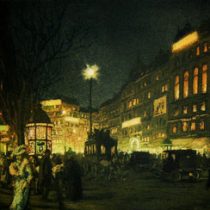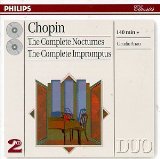Chopin's Nocturnes - Enchanting Night Music
Chopin's nocturnes are intoxicating, beautiful pieces depicting night. Chopin creates lyrical, romantic, and melancholy moods in his nocturnes.
For me, they evoke the mystery of sultry nights under a canopy of stars...
Chopin wrote 21 nocturnes in total throughout his life. 18 of them were published while he was alive, but his earliest ones were published a long time after his death. He actually didn't want this to happen though!
The first major composer of nocturnes was John Field, an Irishman. Chopin took Field's originally simple concept and transformed it.
Chopin's nocturnes are more sophisticated and dramatic than Field's. Interestingly enough, both Field and Chopin both had exactly 18 nocturnes published during their lifetimes.
Nowadays Chopin is by far the most famous composer associated with the nocturne genre.
Although Chopin owed a lot to Field and admired him a lot, John Field thought that Chopin's own nocturnes were too sickly and emotional! Oh well...
Night Music

Each Chopin nocturne has a poetic and free-flowing feeling, like the composer's preludes.
Click here to read about Chopin's magical preludes
They also benefit from the rhythmic technique rubato, where the player slows down and speeds up the tempo to wring the emotion out of the piece.
This flexible rhythm was very innovative at the time, and it contributes to the nocturnes' shadowy and dreamlike sound.
The nocturnes also have brief flashes of amazing piano fireworks, but for the most part they are calm and reflective.
The last of Chopin's nocturnes are highly intelligent pieces, which mark the peak of the nocturne genre.
The Chopin nocturnes were a very important part of the 19th century piano repertoire, and enchanted many a listener and composer. But Chopin's emotional and agitated style got a bit stereotyped, which made some listeners think of it as 'groaning'.
I think Chopin's nocturnes are some of the composer's most graceful and magical pieces, and a perfect example of his uniquely delicate style of music.
List of Nocturnes
- Op. 9 No. 1 in B-flat Major (1830-32)
- Op. 9 No. 2 in E-flat Major (1830-32)
- Op. 9 No. 3 in B Major (1830-32)
- Op. 15 No. 1 in F Major (1830-32)
- Op. 15 No. 2 in F-sharp Major (1830-32)
- Op. 15 No. 3 in F minor (1833)
- Op. 27 No. 1 in C-sharp minor (1835)
- Op. 27 No. 2 in D-flat Major (1835)
- Op. 32 No. 1 in B Major (1837)
- Op. 32 No. 2 in A-flat Major (1837)
- Op. 37 No. 1 in G minor (1838)
- Op. 37 No. 2 in G Major (1839)
- Op. 48 No. 1 in C minor (1841)
- Op. 48 No. 2 in F-sharp minor (1841)
- Op. 55 No. 1 in F minor (1842-44)
- Op. 55 No. 2 in E-flat Major (1842-44)
- Op. 62 No. 1 in B Major (1846)
- Op. 62 No. 2 in E Major (1846)
- Op. 72 in E minor (written 1827-29, published posthumously 1855)
- C-sharp minor (written 1830, published posthumously 1870)
- C minor (written 1837, published posthumously 1870)
Here's a beautiful video of Jorge Bolet playing the Op. 55 No. 1 F minor nocturne:
(Click here to read more about Cuban piano legend Bolet, who's one of my favourite pianists)
And here's a different video, this time of Maurizio Pollini playing one of my favorite nocturnes, Op. 32 No. 2 in A-flat Major:
Good Recordings
Claudio Arrau's recordings from the 1970s on Philips have a strong, golden sound.Arrau manages to capture a very magical feeling with his playing, with just the right tempo and push-pull to let the natural tension of the nocturnes breathe.
Arrau considered Chopin's nocturnes to be the best of the composer's works.
This gives his interpretations a focus and sophistication which some other pianists don't have, since a lot don't think of Chopin's nocturnes as that important (how silly!).
The two disc set comes with Chopin's impromptus as well. Bargain!
Another great pianist to have a look at would be Maurizio Pollini's interpretations. Pollini has a clear and direct style, but I find his nocturnes a bit fast for my taste (except in the video above, where it works really well).
You might also like Chopin's delightful waltzes, or his heroic polonaises.
Return from Chopin's Nocturnes to Composer Overview
Return from Chopin Nocturne to Favorite Classical Composers
If you like my site, please click "Like"... thanks!



